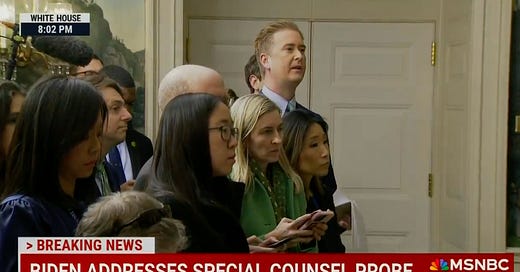Election Countdown, 270 Days to Go: The Elderly Man in the White House.
As with James Comey eight years ago, an intrusive investigator puts his thumb on the electoral scales. Will it make any difference?
A calm moment in yesterday’s impromptu press conference at the White House. A few moments after this, virtually all reporters in the press room were screaming questions at Biden all at once. Biden took the first question from Peter Doocy, of Fox (at rear), who asked whether Biden was in cognitive decline. (Screenshot from MSNBC.)
In bullet-point form, here are my thoughts on the media/politics question of the moment. That question is whether the combination of the tendentious Robert Hur special counsel report, and Biden’s own flub of saying “President of Mexico” when he meant “President of Egypt,” has put Joe Biden’s age “Back at the Center” of this election’s issues, as a New York Times headline declares.
1) Is Biden objectively ‘too old’?
It’s a meaningless question. Biden probably wishes he were 10 years younger. Most voters probably wish 20 or 30 years younger than that.
But from a physiological perspective, “aging” happens at wildly different rates. Oliver Wendell Holmes and John Paul Stevens were influential members of the Supreme Court until age 90. Jimmy Carter was building houses and writing books even longer. On the other hand, Franklin D. Roosevelt appeared to be at death’s door (and was) when running for re-election in 1944. He died a few months later, at age 63. Lyndon Johnson looked ancient when he died at 64. Life is uneven and unfair.
Last month several doctors and other authors assessed evidence that Biden was on the fortunate side of that divide, a “superager” on the Holmes / Stevens / Carter model. This is even though Biden “reads” as older than his near-contemporary Trump, mainly because of the stiffness of his gait. In this piece at MedPage Today and this in The Hill the authors emphasized differential aging rates and said about Biden:
The geriatricians evaluating Biden’s medical history in 2020 found evidence to suggest he could be a “superager” — a subgroup of people aged 80 years and older that operate physically and cognitively at a level that is common among those much younger.1
There is no clinical evidence for cognitive decline in President Biden — despite armchair gerontologists declaring otherwise.
We’ll get back to “cognitive decline” in a moment. Next, the possibility of cognitive improvement:
2) Might Biden be better as an older president than as a younger one?
The job of president finally comes down to judgment calls. Emphasize this bill, and not that one. (For Obama: the health-care act, versus a big environmental act.) Compromise here, but draw the line there. (For Biden, the tradeoffs necessary to get the big economic bills through.) Fight for this appointment, but give up on that one. (For Biden, going with some GOP choices for judges.) Trust this person, not that. Decide where to fight (Ukraine), where to fall back (Afghanistan).
The presidents we respect, looking back, mainly distinguished themselves with these big calls. By my lights, Biden has made these calls correctly at an unusually high rate. There are some missed opportunities he will look back on, but fewer than most of his predecessors. Even if you disagree with his calls, I think you’d have to observe that they were made in a sane and orderly way, through advisors who have shown far less back-biting and squabbling than in previous administrations, and with practically no scandals.
The same Hill piece says on this point, with emphasis in original:
Verbal memory, inductive reasoning and vocabulary increase with age — cognitive skills particularly important for decision-making.
It’s true that “fluid intelligence” (the capacity to learn new ways of solving problems and performing activities quickly and abstractly) does indeed decline with age. But “crystallized intelligence” (accumulated knowledge that allows for intelligent decision-making) and “tacit knowledge” (practical or pragmatic knowledge learned through experience) increase with age.
In practical terms, someone President Biden’s age might take a longer time to learn how to fly a plane, but he would be less likely to crash it relative to a younger person.
“Less likely to crash.” You could do worse as an implicit campaign message.
3) What about that halting cadence?
It’s the stutter. Joe Biden’s lifelong rhetorical challenge.
John Hendrickson, a fellow stutterer, wrote the canonical piece on this topic four years ago. I think about that piece every time I listen to Biden. Phrase by phrase, you hear him feeling his way toward a sound he knows will be a problem—and then finding a way through it, or around it. It’s like respecting someone with a bad leg striding bravely across a stage.
Biden almost never mentions this.2 People who do not know the back story can fall into the trap John Hendrickson so movingly describes: mistakenly thinking that someone who is slow to speak is also slow to think. For most stutterers, the thought itself trips along quickly; the vocal apparatus struggles to catch up.
4) What about El-Sisi as ‘President of Mexico’?
It is too bad for Joe Biden that in his riff to the press yesterday evening he called Abdel El-Sisi the “President of Mexico,” rather than the “President of Egypt.” Two points I’d offer in context:




